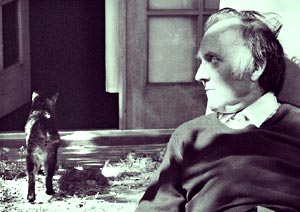Back to Robert Duncan  contents list
contents list
Robert Bertholf
Robert Duncan: A Biographical Sketch
Robert Duncan, along with other poets, established San Francisco as a major center for poetry in the United States. Together with Charles Olson and Robert Creeley, he is also known as one of the principal Black Mountain poets, having taught briefly at the experimental Black Mountain College (March-August 1956) in western North Carolina. He was born in Oakland, California, in 1919. His mother, Marguerite Wesley Duncan, died shortly after giving birth, and his father, Edward Howard Duncan, was unable to keep the child. He was put up for adoption and after six months was adopted by a couple who were “orthodox theosophists” and who chose the baby on the basis of his astrological configuration. He grew up as Robert Edward Symmes (his first poems were published under that name), reverting to his original surname in 1942, after his discharge from the U.S. Army.

Robert Duncan, San Francisco, 1985, photo John Tranter
He was raised mainly in Bakersfield, California, where his adopted father was an architect. His grandmother had been an elder in a Hermetic order similar to William Butler Yeats’s Order of the Golden Dawn. The tales told and read to him as a child by his parents and the appropriately named Aunt Fay were as lasting and important as any of his later literary influences and establish a constant world of reference in the poems. A high school English teacher, Edna Keough, introduced him to the poems of H.D. and the stories of D. H. Lawrence. By the time he was eighteen, he was committed to poetry: “I recognized in poetry my sole and ruling vocation.”
He attended the University of California at Berkeley for two years, 1936-1938, published his first poems in school magazines, and read James Joyce, Gertrude Stein, and Ezra Pound. He went East in 1938, living in Philadelphia and New York, where he became part of the circle of Anaïs Nin that included Kenneth Patchen and George Barker; he also read Edith Sitwell, Jean Cocteau, and met the French Surrealists. In New York he followed exhibitions in art galleries and museums, and witnessed the emergence of Abstract Expressionism. His article “The Homosexual in Society” appeared in the magazine
Politics in 1944; it has become a benchmark document for gay activism and individual freedom.
He eventually returned to Sonoma County north of San Francisco in 1945, and in the spring of 1946 he moved to Berkeley, where he soon met Jack Spicer and Robin Blaser; the three poets launched “serial form” in poetry. Duncan’s sequence
Medieval Scenes, written in 1947 and published in 1950, was the first example of the new form. He cultivated his Anarchist politics, which he developed in New York, by joining the small group of poets meeting with Kenneth Rexroth in San Francisco. He again attended the University (1948 — 1950), studying medieval and Renaissance civilization under the noted scholar Ernst Kantorowicz. In 1951 he began a life-long domestic partnership with the painter Jess Collins, and in 1952 he joined the group of poets publishing in
Origin magazine after responding to a poem published there by Denise Levertov. His association with the
Black Mountain Review then followed, as did a regular correspondence with Charles Olson and Denise Levertov. Following Olson’s death, Duncan became the leading spokesman for the poetry of open forms in America.
Duncan published regularly in little magazines and with small presses, but his first major trade book,
The Opening of the Field, appeared in 1960; that book was followed by
Roots and Branches (1964) and
Bending the Bow (1968). When he reprinted and expanded
Caesar’s Gate (1972), at what seemed the height of his prestige, he announced that he would not publish another collection for fifteen years (although poems occasionally appear singly or in small separate publications), when a volume to be called
Ground Work: Before the War would prepare the way for the work of his final years. That volume appeared in 1984, and for it Duncan received in 1985 the National Poetry Award and the American Book Award from the Before Columbus Foundation.
Ground Work II: In the Dark (1987) appeared just two months before Duncan’s death.
The serial poem “The Passages Poems” began in
Bending the Bow and continued through the final volume; the series is a groundbreaking contribution to the poetics of the New American Poetry. Duncan’s early poems have been collected in two volumes,
The First Decade: Selected Poems 1940-1950 (1968) and
Derivations: Selected Poems 1950-1956 (1968), and his very earliest work has been published as
The Years as Catches: First Poems (1939-1946) (1966).
In 1984 Duncan suffered kidney failure and he died from complications of that condition in 1988.
it is made available here without charge for personal use only, and it may not be
stored, displayed, published, reproduced, or used for any other purpose
This material is copyright © Robert Bertholf and Jacket magazine 2005
The Internet address of this page is
http://jacketmagazine.com/28/dunc-bert-sketch.html
